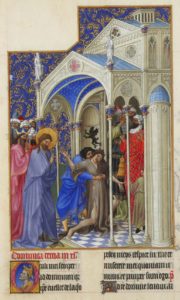Thoughts on Sunday’s Lessons for Sept. 30, 2018

Jesus Exorcizing a Demon. Folio in Les Très Riches Heures du duc de Berry (1416); Musée Condé, Chantilly, France. (Click image to enlarge.)
Sunday offers us the only reading from the book of Esther that we hear during the entire three-year lectionary period. We come in toward the end of the book, just in time to hear the ending of this story that, in Jewish tradition, is read in its entirety on the feast of Purim. Esther is the only book in the entire Bible that doesn’t mention God, but it tells a stirring, albeit legendary, story of the Jewish people. We hear Queen Esther of Persia reveal at a banquet feast that she is Jewish and would herself be killed with her people if the wicked Haman carried out his plan to kill or enslave all of Persia’s Jews. The angry king orders Haman hanged on a giant gallows, and the event is remembered with feasting, gladness, and gifts of food to each other and to the poor.
First Reading (Track Two): Numbers 11:4-6, 10-16, 24-29
Listen! We listen for the voice of God. We ask God to listen to us when we pray. We listen to each other, and sometimes we hear. Listen for themes of listening and hearing in Sunday’s readings. In our first reading we hear the people in the desert, sick and tired of manna, hungrily remembering the good food they enjoyed in Egypt; so hungry that they would eagerly return to Pharaoh’s slavery for something good to eat. God is angry. Moses is angry! Fortunately, God offers a practical solution: Moses may name seventy elders to help him carry the load of leadership. Then, two men who had remained in the camp started prophesying without supervision! Moses’ assistant Joshua wants them punished, but Moses says no: If only all the people could prophesy and share God’s spirit.
Psalm (Track One): Psalm 124
Remembering another time when Israel feared death at the hands of enemies, Psalm 124 sings joyous thanksgiving for God’s protection, parting the waters of the Red Sea when they escaped Pharaoh’s bondage in Egypt. If God had not been on their side when the enemies rose up against them, we sing, the waters would have overwhelmed them! The torrent would have gone over them! But God did not give them up. They escaped, singing, “Our help is in the Name of the Lord, the Maker of Heaven and Earth.”
Psalm (Track Two): Psalm 19:7-14
Listen and hear, as we sing this psalm that calls on us to pray and tells us why we should pray. God’s commandments are good, and to follow them does us good, we sing. Sweeter than honey and more desirable than gold, God’s laws and commandments enlighten us and keep us on a straight path. How do we pray? The answer is so important that it’s repeated twice: “Let the words of my mouth and the meditation of my heart be acceptable to you, O Lord, my strength, my rock, and my redeemer.”
Second Reading: James 5:13-20
As we reach the end of our monthlong visit with the letter of James, this powerful epistle has called on us to care for our neighbors, to protect the weak, and to do the work that God has given us to do. Now the letter ends with a call to prayer, listing several conditions in which we might choose to pray. Are we suffering? Pray! Are we happy? Sing hymns of praise! Are we sick? Ask our friends to prayer! Prayer works. When we bring our brothers and sisters back to God’s way, we save them from death, for God works through us as God worked through the prophet Elijah when he prayed for an end to a killing drought and famine.
Gospel: Mark 9:38-50
The beginning of Mark’s Gospel this Sunday seems to echo an element of the Track Two first reading: Just as some of Moses’ followers, and Joshua, were angry about two seemingly unauthorized members of the community who started prophesying, the Apostle John tried to stop a stranger who was casting out demons in Jesus’ name. But Jesus tells them to be glad, rather, that others are speaking in his name: “Whoever is not against us is for us.” Then Jesus offers a series of scary warnings about doing things that cause others to stumble: “If your hand causes you to stumble, cut it off … And if your eye causes you to stumble, tear it out.” Fortunately, this was surely not literal advice. Jesus, as he often does, is following an old rabbinic tradition, illuminating everyday actions by comparing them to their most extreme alternatives.
What are “Track 1” and “Track 2”?
During the long green season after Pentecost, there are two tracks (or strands) each week for Old Testament readings. Within each track, there is a Psalm chosen to accompany the particular lesson.
The Revised Common Lectionary allows us to make use of either of these tracks, but once a track has been selected, it should be followed through to the end of the Pentecost season, rather than jumping back and forth between the two strands.
For more information from LectionaryPage.net, click here.
